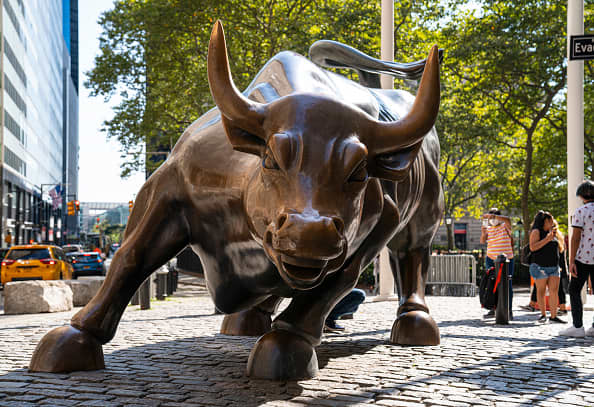The bronze Charging Bull in the financial district of New York City.
Robert Nickelsberg | Getty Images
LONDON — The SPAC craze is starting to gain some momentum in Europe.
After a banner year for so-called special purpose acquisition companies in the U.S., a growing number of blank-check firms are raising funds with the intention of snapping up a European tech company.
SPACs are shell companies that are created with the sole purpose of raising funds to acquire an existing private company, so that the target firm can bypass the traditional initial public offering (IPO) process.
These blank-check companies raised a total of $78.2 billion across 244 IPOs in the U.S. last year, according to data from Refinitiv. The U.S. SPAC mania continued into 2021, with another 134 firms raising nearly $39 billion since the start of the year.
The attraction of SPACs is that they offer a way for companies to fast-track a stock market listing. An IPO can be a much longer process, and some firms are eschewing the traditional route to avoid potential swings in market sentiment. IPOs have also attracted criticism from venture capitalists like Ben Gurley, who worry they are being underpriced.
SPACs provide an alternative to IPOs, as well as direct listings where firms sell existing shares to public market investors. They often attract high-growth tech firms. Last year, U.K. electric vehicle maker Arrival announced a deal to go public via a merger with a U.S. blank-check firm.
Mostly a U.S. phenomenon
Europe has largely missed out on the SPAC boom. Just three SPACs listed in Europe last year, netting $495 million. And not a single SPAC has debuted in the continent so far this year.
SPACs aren’t a new phenomenon, but they flourished in the U.S. in 2020. Investors’ funds are held in a trust account after a SPAC completes its IPO, and shareholders can vote against the deal if they don’t agree with it and get their money back.
Industry insiders say that SPACs tend to be structured differently in the U.S. compared to Europe. And Europe is home to far fewer publicly-listed tech companies than America, which makes it harder for investors and analysts to make comparisons and benchmark firms in the sector.
London’s stock exchange is looking to lure more SPACs and has contacted law firms and banks to see if they can facilitate the listing of such vehicles, a source familiar with the matter told CNBC.
The person preferred to remain anonymous as the talks haven’t been made public.
Meanwhile, the U.K. has launched a review into its listings rules in a bid to attract more tech firms to the market. Europe as a whole had a markedly quiet year in terms of tech IPOs last year, whereas the U.S. saw a flurry of major debuts from the likes of DoorDash and Airbnb.
“Unfortunately in Europe, interesting and attractive companies don’t have the same access to capital as they do in the U.S., either in the private domain, nor on the public markets,” Makram Azar, CEO of Golden Falcon Acquisition Corp, a SPAC focused on European tech, told CNBC’s “Street Signs Europe” Friday.
“The venture capital pool of money for example is much smaller in Europe than it is in the U.S. and the IPO market is very weak.”
Deals in the works
An increasing number of blank-check firms are listing in New York with an aim to buy a European tech firm.
Azar, the former chairman of banking for Europe at Barclays, raised $345 million for his SPAC in an IPO in December. Golden Falcon is looking to take a European “champion” in tech, media and telecoms (TMT) or fintech public.
“There are over 60 TMT and fintech unicorns in Europe,” more than 20 of which are based in the U.K., Azar said, adding he sees “very attractive companies” in the region.
Fintech has been a particular boon to Europe’s tech sector over the years. Adyen, a payments firm listed in Amsterdam, has seen its share price more than double year-over-year. And there are increasingly valuable companies in the private markets, such as Checkout.com and Klarna.
Another SPAC, North Atlantic Acquisition Corp, raised $379.5 million in its IPO last month. The company is mainly seeking out targets in the consumer, industrials and TMT sectors in Europe.
“It’s an interesting market in Europe,” said Gary Quin, CEO of North Atlantic Acquisition Corp and the former vice chairman of Credit Suisse’s investment banking division in Europe. “We’re seeing a pipeline of deals coming from a few different areas.”
Quin said he expects his SPAC to secure a deal to combine with a European firm “sometime between January and two years from now.”
Some European companies are already thinking of merging with SPAC companies.
One SPAC had over 10 companies call shortly after its IPO, a source familiar with the matter told CNBC. The person preferred to remain anonymous due to the sensitive nature of the discussions.
SPACs aren’t able to engage potential merger targets until after they’ve listed.
Europe has often been seen as lagging the U.S. and China when it comes to tech, but the region is growing fast. European start-ups raised a record $41 billion in funding last year, according to London-based venture capital firm Atomico.
